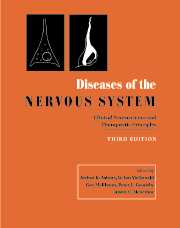Book contents
- Frontmatter
- Dedication
- Contents
- List of contributors
- Editor's preface
- PART I INTRODUCTION AND GENERAL PRINCIPLES
- PART II DISORDERS OF HIGHER FUNCTION
- PART III DISORDERS OF MOTOR CONTROL
- PART IV DISORDERS OF THE SPECIAL SENSES
- PART V DISORDERS OF SPINE AND SPINAL CORD
- PART VI DISORDERS OF BODY FUNCTION
- PART VII HEADACHE AND PAIN
- PART VIII NEUROMUSCULAR DISORDERS
- PART IX EPILEPSY
- PART X CEREBROVASCULAR DISORDERS
- PART XI NEOPLASTIC DISORDERS
- PART XII AUTOIMMUNE DISORDERS
- PART XIII DISORDERS OF MYELIN
- PART XIV INFECTIONS
- 101 Host responses in central nervous system infection
- 102 Viral diseases of the nervous system
- 103 Neurological manifestations of HIV infection
- 104 Neurological manifestations of HTLV-I infection
- 105 Clinical features of human prion diseases
- 106 Bacterial infections
- 107 Parasitic disease
- 108 Lyme disease
- 109 Neurosyphilis
- 110 Tuberculosis
- PART XV TRAUMA AND TOXIC DISORDERS
- PART XVI DEGENERATIVE DISORDERS
- PART XVII NEUROLOGICAL MANIFESTATIONS OF SYSTEMIC CONDITIONS
- Complete two-volume index
- Plate Section
105 - Clinical features of human prion diseases
from PART XIV - INFECTIONS
Published online by Cambridge University Press: 05 August 2016
- Frontmatter
- Dedication
- Contents
- List of contributors
- Editor's preface
- PART I INTRODUCTION AND GENERAL PRINCIPLES
- PART II DISORDERS OF HIGHER FUNCTION
- PART III DISORDERS OF MOTOR CONTROL
- PART IV DISORDERS OF THE SPECIAL SENSES
- PART V DISORDERS OF SPINE AND SPINAL CORD
- PART VI DISORDERS OF BODY FUNCTION
- PART VII HEADACHE AND PAIN
- PART VIII NEUROMUSCULAR DISORDERS
- PART IX EPILEPSY
- PART X CEREBROVASCULAR DISORDERS
- PART XI NEOPLASTIC DISORDERS
- PART XII AUTOIMMUNE DISORDERS
- PART XIII DISORDERS OF MYELIN
- PART XIV INFECTIONS
- 101 Host responses in central nervous system infection
- 102 Viral diseases of the nervous system
- 103 Neurological manifestations of HIV infection
- 104 Neurological manifestations of HTLV-I infection
- 105 Clinical features of human prion diseases
- 106 Bacterial infections
- 107 Parasitic disease
- 108 Lyme disease
- 109 Neurosyphilis
- 110 Tuberculosis
- PART XV TRAUMA AND TOXIC DISORDERS
- PART XVI DEGENERATIVE DISORDERS
- PART XVII NEUROLOGICAL MANIFESTATIONS OF SYSTEMIC CONDITIONS
- Complete two-volume index
- Plate Section
Summary
Introduction
Human prion diseases are rare disorders affecting the central nervous system, characterized by protracted incubation periods, progressive and eventually fatal neurological deficits and the deposition in the brain of prion protein (PrP) (Prusiner, 1994). Scientific interest in this group of diseases has been stimulated by the accumulating evidence in support of the prion hypothesis, which proposes that the transmissible causal agent is a post-translationally modified ‘infectious’ form of a normal host-encoded protein, PrP (Prusiner, 1982) (Chapter 6). There has also been an extraordinary level of public interest in prion diseases following the occurrence of bovine spongiform encephalopathy (BSE) and the proposition that this cattle disease has been transmitted to humans to cause a novel human prion disease, variant Creutzfeldt–Jakob disease (vCJD) (Will et al., 1996).
Although human prion diseases are rare, concern about the possibility of such a diagnosis is not uncommon, particularly after the extensive media coverage of the potential risks of BSE to public health. This chapter describes the clinical features and diagnosis of human prion diseases.
Classification of human prion diseases
Table 105.1 lists the different forms of human prion disease, which are classified according to etiology and distribution. Genetic forms of human prion diseases are associated with mutations of the prion protein gene (PRNP) which is located on chromosome 20 in humans (Gambetti et al., 1999). Codon 129 of PRNP is a polymorphic region, expressing either methionine or valine, and variations in genotype can influence susceptibility to disease and/or clinicopathological phenotype in all human prion diseases (Table 105.2).
Kuru
Kuru was transmitted from person to person through the consumption of infected tissues during cannibalistic rituals (Gajdusek, 1981). Women and children were most often affected, because they consumed the tissues such as brain, which contained the highest levels of infectivity (Alpers, 1979). The incidence of kuru has declined since the cessation of cannibalism in the late 1950s, but cases are still occurring with incubation periods exceeding 40 years (Klitzman et al., 1984).
In kuru homozygosity at codon 129 of PRNP is associated with an earlier age at onset and possibly a shorter incubation period than heterozygotes (Cervenakova et al., 1998). The codon 129 genotype does not have a major influence on the clinical features, but can influence the pathology with plaque deposition being more frequent with a methionine allele.
- Type
- Chapter
- Information
- Diseases of the Nervous SystemClinical Neuroscience and Therapeutic Principles, pp. 1716 - 1727Publisher: Cambridge University PressPrint publication year: 2002
- 1
- Cited by



